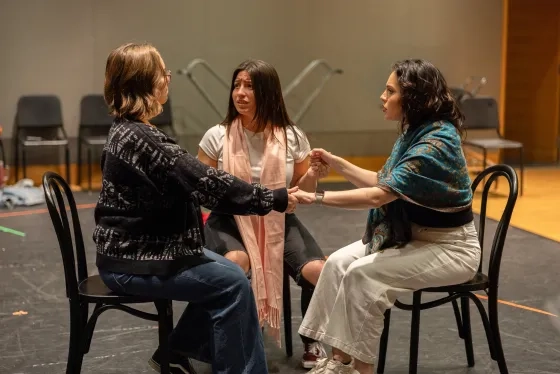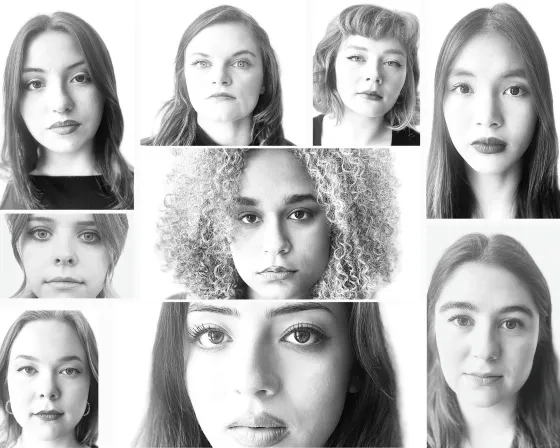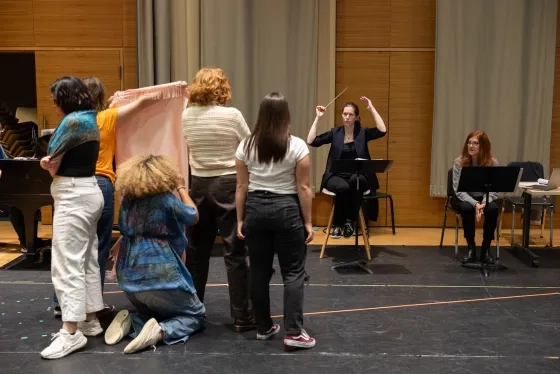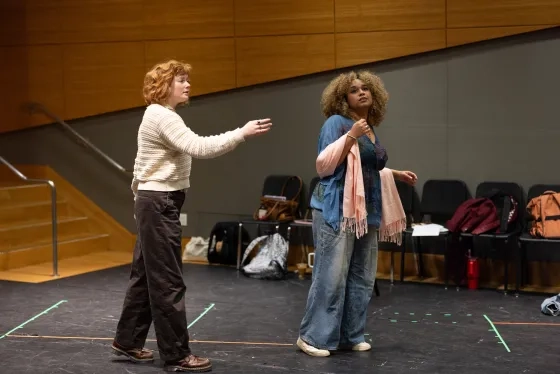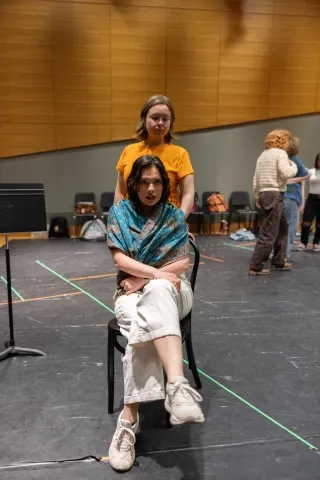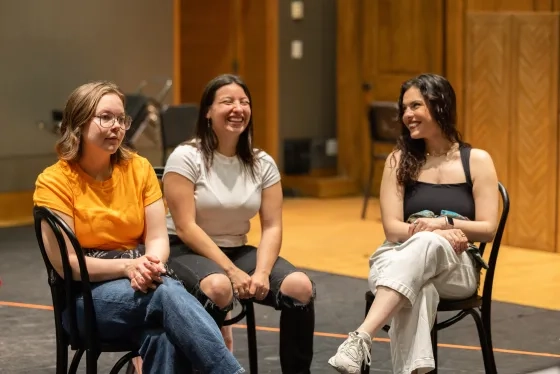‘The Most Challenging Thing I’ve Ever Done:’ SFCM’s Spring Chamber Operas
Errollyn Wallen's 'Anon' and R. Vaughan Williams’ ‘Riders to the Sea’ make for a heavy but rewarding double-bill, presented in May.
SFCM’s Spring Chamber Opera this year features a double bill of topics usually glossed over in society: Sexual violence against women and death. But despite the darkness of the material, the experiences of the students bringing the work to life shine through.
Errollyn Wallen’s Anon takes as its base Abbé Prevost's 1731 novel Manon Lescaut. But the composer diverged from the source material by interviewing sex workers, sex trafficking victims, and other women who have experienced sexual violence for the libretto, creating an experience that, despite its heaviness, is ultimately necessary for audiences and liberating for performers. Its staging at SFCM is a milestone: An opera written by a Black woman starring and creatively directed by women.
“Errollyn Wallen is brilliant, and a couple of us opera faculty have heard of her because she's kind of exploding in the international new music scene and her orchestral works keep getting more and more performances,” says Opera and Musical Theatre faculty Dana Sadava, who’s conducting the piece.
Opera and Musical Theatre Chair Heather Mathews adds one thing that makes the heavy material more doable is that it’s only 35 minutes arranged as 19 vignettes, none of which last for more than a minute and a half. “So you have moments that are quite difficult to comprehend, that you want to get away from—and then you do, you just move on to the next scene. So while these are dark, there's nothing that you actually have to sit in too long.” As an example, voice student Melanie Athans explains, “There's a very poignant moment for me where I switch from predator to prey, basically: In an instant I go from somebody who's abducting a young woman to somebody who is being catfished on the internet and thinks they're meeting a 17-year-old boy and that person is actually 53 years old.”
Anon’s material was initially difficult for some of the cast, Cristina Villalobos says. “I was intimidated and a little worried to be in an opera like this because it deals with such sensitive material. It's a little scary to do on stage, especially because we’ve all heard each other’s experiences with the topics discussed.”
Another cast member, Stacee Firestone, added, “When I first got it and I was going through the music, at first my reaction was, ‘What is this?’ I didn't understand, I just didn't really get it. But when we had our first sing-through, I got it immediately: This is one of the most impactful pieces I think I've ever been a part of.”
Part of dealing with the subject material was having frank discussions about uncomfortable topics and how all women have to deal with the issues presented in Anon, ranging from the everday to the life-changing. Athans says, “The faculty has just been so fantastic in bringing their own experiences and empathy to this. It's very clear in Dana's conducting and in Heather's staging and directing that they get it. I'm very grateful to have these mentors and these colleagues to coalesce this into what it can be.”
Production leaned on a specific method to keep a degree of separation between students and their characters. “We do this thing before every rehearsal, called ‘zip up,’” Firestone explains. “We stand there, and we step ‘into’ our character, and then we zip up. It almost feels like a whole body reset, and then we’re ready to go: We’re not in our bodies; we’re not claiming this pain, we’re just here to work and make music and give that our all. Then right afterward, we unzip, go back into ourselves and then we'll just carry on with our day. Although there have been some times that I’ve had to come home and decompress by watching something funny.”
Anon didn’t give students any breaks in the musical department, either. “The music is super-different," Villalobos says. “There's no big arias in this; you’re singing the whole time as a group. The harmonies are really tricky as well: One of our coaches told us, ‘If you can sing this, then you can pretty much sing anything.’” Firestone added, “This is the most challenging thing I’ve ever done here. Sometimes the music will be really almost atonal; another piece will have a million polyrhythms and different harmonies that don't seem to go together on the page. But when they're put together, it creates this powerful storm.”
The other performance on the bill, R. Vaughan Williams’ Riders to the Sea, is also a dark story: Based on a 1904 play of the same name by Irish playwright John Millington Synge, it primarily deals with a family who have suffered six deaths in their family.
“We decided on Anon first,” Riders conductor and Musical and Managing Director of Opera Curt Pajer says. “And it's so serious that we briefly thought about combining it with a comedy, but we realized that would trivialize it. So we had to find something else that was on the serious side, and actually, I think it balances out our season very well, because our other spring productions Così fan tutte and Candide were comical.” Opera and Musical Theatre puts on multiple productions a year; earlier this year Leonard Bernstein’s Candide was a sold-out success and got rave reviews.
Similar to Anon, “there are no arias to speak of,” Pajer says. “There are leitmotifs that give it cohesion—and that's what keeps the thing together—but there's almost no ensemble writing. If characters are singing at the same time, one of them is usually just intoning without words, or keening, as part of the mourning ritual.”
Director Sergey Khalikulov adds, “Riders doesn’t have a hopeful ending, but I draw hope from the act of telling people's stories. That's the part we end the show with: While we watch these stories, these tragedies, these traumas, we have this cathartic experience, and in the end, what's hopeful about it is that we were able to tell the story. Students often want to know why we're doing a certain piece. And for me that’s because we have the ability to showcase what life could have been like at this time, and ultimately any experience like that gets us out of ourselves and creates more empathy and understanding.”
Firestone echoes that sentiment, explaining, “The reason I wanted to do this—and I would do it again—is because so many women go through this, and they never talk about it.”
“Society has always taught you to be prim and proper and to never talk about hard things,” she continues. “Being in a show like this, where that's all we're confronting, is gut-wrenching and horrible, but it's still so beautiful that we get to tell it.”
The double bill of Anon and Riders to the Sea takes place on Thursday, May 8th and Friday, May 9th at 7:30 pm in the Caroline H. Hume Concert Hall at SFCM’s 50 Oak Street building. Tickets for the 8th can be reserved here; tickets for the 9th here.
Learn more about studying Opera and Musical Theatre at SFCM.
